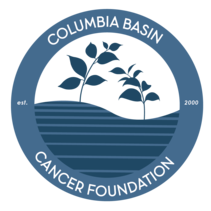Newsletter: Winter Issue 2023
Over 830 Meals delivered in 2023!
Our foundation is proud to provide delicious and nutritious meals for our clients going through active treatment. These meals are prepared byLion’s Den biweekly for the entire family, for our clients that are going through chemo or radiation treatment. Clients look forward to meal day when they can just relax and enjoy a wonderful meal as a family. For many it is on their treatment day, making it more special and appreciated.
This program also allows us to bless clients and their families during the holiday season with full Thanksgiving and Christmas meals delivered to their house. We are proud of this Donor & Volunteer Powered program, which could not be done without the support of the community.
In 2023, 835 Meals & 98 produce bags were served to our clients and their families. Our four amazing volunteer drivers clocked in over 4,000 miles driven through Grant and Adams County.
Thanks to our Sponsors:
Memory-making is priceless, and it is never more true than after a family experiences a cancer diagnosis.
Capturing these memories are so very important, and the wonderful Shannon Michelle Photography understands that and wants to help.
Shannon Michelle Photography donates her time and talents to capture beautiful images for our cancer clients and their families. We appreciate that it might not be the perfect time for family photos, but all moments are worth capturing.
Cancer Chronicles with Cynthia Dano
As you can imagine, or perhaps know, hearing the words,”you have cancer” is not only shocking and devastating, it also yanks out a lot of our ‘roots’. Things we have rooted our life to… stability, trust, and control. It also exposes our vulnerability. In general, I feel like we, societally, need to treat someone with cancer similar to someone who is grieving. Because, in reality, they are (even if they don’t know it). Loss comes hand in hand with cancer. The stages of grief…shock, anger, depression, bargaining, denial, guilt, acceptance…are all part of cancer.
When I got cancer the first time, I had my survival blinders on and did not give recognition or acknowledgment to grief. My sole focus was getting through-my emotions were the collateral damage of my personal war with cancer. The grief hit me hard a few years later and frankly, I’m still having repercussions. It’s not called PTSD for nothing.
Cancer also exposes the abandonment ‘root’ (as in my health and body are abandoning me) and also because many people are abandoned by others in this time of need. Oftentimes, because others don’t know how to respond, what to do or what to say. It’s uncomfortable. Yes it is. And even more so for the one with cancer. Most of us going through cancer also realize that others (caregivers, friends and loved ones) are also processing their feelings. It’s not easy for anyone. The first time around, I was given very good advice…“let people help in even the smallest of ways. They know they can’t cure your cancer, but they can do___. Let them. It is a gift to you and to them.” That helped me so much and gave me a new perspective. Being the independent type, I didn’t want to show vulnerability and ask for help, so this advice was a gift in many ways.
I realize it is difficult to know what to say or do, since everyone is an individual, everyone is in a different stage of grief and we don’t fully understand what ‘roots’ may have become exposed for them. In addition to my personal experience, and just to make sure I was speaking for more than myself, I checked some websites (American Cancer Society, Caring Bridge, Cancer.Net, and Cancer Council Victoria were the ones I consulted and borrowed from) on such things and asked some friends and clients who have/had cancer to get their opinion. (And a big thank you to those of you who gave us your feedback!) Here are some suggestions…
Some Do’s -
Saying “I’m very sorry you are going through this”or “I’m sorry this has happened to you.” Most of us have had our lives turned upside down, and this amount of empathy is appreciated. If you say,“I’m here for you.” Mean it. Show up. One of the hardest things is for someone to say that, but never really follow up. So, if you don’t mean it, or can’t really be there for someone, please don’t say it. That’s perfectly ok.
“I care for/about you.” “If you feel like talking, I’m here to listen.” “I’m thinking of you” Are all helpful.
Asking if they would like to talk about their experience can be the opening for them and lets them be in charge of what and when to share. If the person wants to talk, practice active listening…give your full attention, avoid distractions and judging or thinking of what to say next, and look them in the eye. Take cues from them on how much they want to talk and share. Sharing silence is also supportive. There is no need to fill the space with chatter. Show support without words…facial and body expressions can convey concern. Acknowledge what has been said. They may be experiencing anger, depression or any number of emotions…they are normal. Just being a sounding board is helpful. Always ask before giving advice.
Providing presence. This is called “sustaining”. Being physically around, can be calming and shows care, especially if this is someone you know on more than an acquaintance basis. Words are not always needed or wanted.
If you have had a similar experience, you can say,“I think I understand some of what you may be going through. If you would like to talk about it or think my experience may be helpful to you, I’m here.” Or if you know someone who has experienced something similar and know they would be willing to talk to this person, you can pass that on to them. Give practical support such as fixing meals, running errands, taking care of pets, cleaning, taking them to appointments or treatments. Offer specifics, “Let me help you with___”. Or ask specifically what would be most helpful to them. There are online tools to help manage everyone’s involvement. If the person with cancer has a caregiver, offering help to the caregiver can also be a godsend.
Reach out regularly, just to let them know you are thinking of them. Staying in touch is better than staying away. The cancer journey can be long and arduous -from diagnosis through treatment and beyond (even reintegrating as a cancer survivor, can be difficult)-I can’t tell you how much comfort this brought me. Being sent a text on a fairly regular basis (once a week felt nice to me) was so meaningful and I knew I had not been forgotten. Cards and calls are also appreciated.
Before giving advice or information about research or treatments you may have heard about, make sure it’s ok.Ask permission and be prepared to stop if you can see it’s not landing well. It’s perfectly fine to not know what to say. In fact, saying,“I don’t know what to say, but I want you to know I care.” Is perfect. This is preferable to not saying anything, avoiding them or the topic or not calling or visiting. Be honest about your feelings…such as fear, disbelief or anxiety. I appreciated my friends showing emotion and sharing the emotion. Just be careful of not oversharing or overburdening the person.
Setting up a meal or prayer chain can be helpful.
Respect their privacy. This one is huge! This is their journey which means, it is up to them to decide with whomthey choose to share information. If they don’t confide in you immediately, don’t take it personally. If theychoose to share with you, do not share with anyone else without asking their permission. Some of us are veryprivate and do not want that information to be shared and it can be devastating for a confidence to bebroken. Be prepared with a response for those who may ask about the person, such as, “It’s not up to me toshare this, but I’m sure ____will appreciate your concern. I’ll let them know you asked about them”.
Tell them they are beautiful! Beauty is not skin deep and cancer treatments can take a physical toll. Most of usdo not feel very attractive during chemo or radiation. Reminding someone they are beautiful in spite of this canbe a morale booster. If they look good, let them know! “How are you doing?” can be a loaded question, so itmight be better to preface it with “This must be very difficult, how are you doing and feeling?” Or “I can onlyimagine what you are going through, how are you doing?” or some variation of these. The important thing is topreface it with the acknowledgement of the situation before asking the ‘how are you doing’ part.
These are a few things. There are a number of cancer websites with helpful advice and other ideas. Caring Bridge is one of those and can be helpful to the person with cancer and anyone who cares about them.
Some Don’ts-
Do not compare what they are going through with something you or someone you know has gone through. It’snot the same. If you know someone with the same diagnosis, only mention it in the context of maybe they canbe a support for each other, not anything about the prognosis or how that person responded to treatment.
Do not say “I know what you are going through”, or “I know just how you feel.” you don’t.
Be careful not to overburden with too many questions-they can be exhausting, especially if the person has torespond to many people.
Some things to not say seem so obvious, but apparently they aren’t. Never say: Everything happens for a reason.
I know just what you should do.
Oh, that’s an easy cancer, Don’t worry.
I’m sure you’ll be fine.
You got this.
You’re strong, you can beat this.
What doesn’t kill you makes you stronger.
This is God’s plan.
How long do you have?
You look pale. You’ve lost weight.
Or any other comment that indicates they look sick.
Don’t appear too positive or make light of the situation. Don’t withdraw, avoid contact or stay away for fear of burdening them. I liked hearing about my friend’s day and daily struggles-it was not a burden. It let me forget about my problems and had a sense of normalcy.
If you or someone you love is going through cancer, please visit one of the above mentioned sites and if you are on Facebook or other social media site, find a group specific to your type of cancer. The support and knowledge within these groups can be inspiring, provide hope and be life sustaining.
A special note to cancer healthcare providers: I get that you deal with cancer patients every single day and it has to be overwhelming and daunting at times. Please remember that for most of us, this is not routine and very scary. You may see many patients, but each of us has a story.
Treat us with care. Some of us do not have support, you may be the only contact we have and it is especially hurtful when we are treated like just another body. We are a person first and foremost. A person who happens to have cancer, not cancer that happens to be in a person.
Treat us like a friend, a mother, a father, a sister, a brother, a daughter or a son. Because we are.
Wishing you all a healthy and peaceful holiday season.
This was an excerpt from my upcoming book, “Uprooted”
cynthiadano.com







